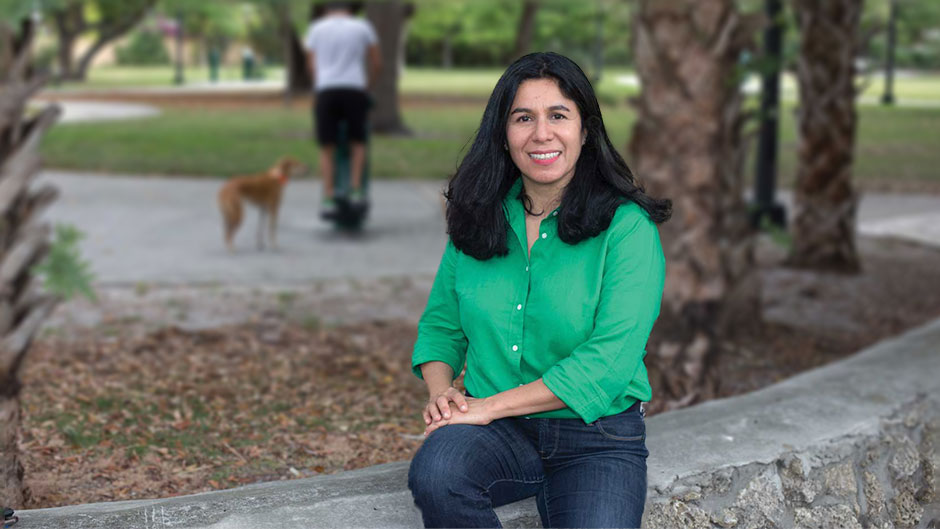To Maria Nardi, B.Arch. ’91, a devoted Miamian who moved to the city from Ecuador when she was ten, a park is more than just a park – it’s a part of creating and shaping sustainable, equitable cities and building communities. And it’s part of a mission, ingrained in her for as long as she can remember, to make a positive contribution toward building a better world.
As director of Parks, Recreation, and Open Spaces for Miami-Dade County, Nardi oversees the third largest and one of the most diverse parks systems in the country, serving 2.8 million people. The park system encompasses over 270 parks and over 13,500 acres of land that include recreation centers, pools, 17 miles of beaches, marinas, a world-renowned zoo, natural areas, golf courses, and greenways, to name a few of its amenities.
“I have a strong conviction that parks will help save the planet,” Nardi says. “As cities become more densely populated and crises such as the pandemic and concerns about climate change increase, parks are being recognized as powerful solutions for urban communities and local economies.”
Indeed, the role that parks and outdoor recreation spaces can play in improving our health and well-being as well as the environment has become even clearer in recent months, as the pandemic has placed a premium on access to nature and the outdoors. “During this unprecedented time,” Nardi said, “parks once again proved themselves to be critical public health infrastructure, strengthening neighborhoods and building bonds among people from all walks of life.”
Nardi’s career began at the University of Miami, where she learned to see architecture as more than building a single structure. Inspired by Professor Joanna Lombard and the then-dean of the School of Architecture, Elizabeth Plater-Zyberk at the U, she saw architecture and urban design effect change and build community.
After obtaining a master’s degree in landscape architecture from Harvard University, Nardi returned to Miami to begin work, focusing on creating an environment that favored people over cars. With the City of Miami, she worked with commissioners to launch Miami21, the rewrite of the city’s zoning codes toward building a more walkable, pedestrian-friendly community.
It was from there that Nardi was hired by the Miami-Dade County Parks Department to create a masterplan for the county’s parks. This brought an opportunity to bring the transformational capacities of architecture, landscape architecture and urban design to the public through an open process, engaging Miami-Dade residents in more than 300 meetings across the county, and collaborating with park professionals in Miami-Dade’s 34 municipalities to develop a shared vision.
This unprecedented gathering of people from all parts of the county expanded the vision to bring parks to the forefront of advancing a healthier, more resilient and sustainable community. The resulting plan spans from Biscayne Bay to the Everglades and from south of Florida City to north of Miami Gardens and Aventura, providing a shared vision for a system of parks, public spaces, natural and cultural areas, interconnected through a series of greenways and blue ways, with streets designed to serve as linear parks. “The goal,” Nardi says, “is that wherever you are in the county, as soon as you walk out of your door, you are entering a great parks system.”
Nardi’s visionary method of developing the plan and the transformative potential of the Miami-Dade Parks and Open Space Masterplan has been recognized by the White House and the National Park and Recreation Association as a national model. She has received numerous architecture and landscape architecture awards, including the University of Miami School of Architecture Alumna Award for Outstanding Contribution to the Architecture Profession and the Miami-Dade Commission for Women In the Company of Women Mayor’s Pioneer Award.
As a member of the parks department and now as its director, Nardi leads a team of 2,300 parks professionals committed to improving the quality of life for all the county’s residents through parks. The department’s work includes the implementation of award-winning health and fitness and conservation programs, as well as a $400 million capital program. And, to inspire and active park champions, she initiated the Parks Civilian Conservation Corps, the department’s signature volunteer program.
But the most rewarding aspect of her job, Nardi says, remains the privilege of working with an extraordinary group of dedicated park professionals committed to serving the community. “One of the great things about parks is that it doesn't matter who you are, where you come from, the color of your skin,” she says. “We come to a park as equals. We bring people and communities together, and when the pandemic is gone, parks will continue to improve our lives, helping our community emerge stronger, healthier, more equitable, and more resilient than ever before.”

